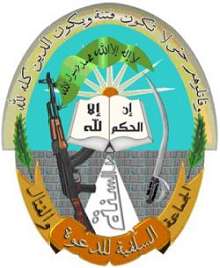When he was arrested in Dubai in July 2001, Djamel Beghal, a French Algerian already known to French services, confessed he had been ordered by Osama bin Laden's top lieutenant, Abu Musab al-Zarqawi, to set up a terrorist cell to strike US interests in France. He admitted he had attended meetings in Afghanistan's training camps in preparation to blow up the US Embassy in Paris. But when he was later extradited to France, Beghal denied any involvement in terrorist activities. During his trial in Paris, Beghal delivered a detailed testimony accusing Emirates interrogators of having psychologically and physically tortured him to accept an already established scenario. "This attack never existed, neither in my imagination, nor in reality," said Beghal.
Beghal, who is being judged with five co-defendants, is accused of recruiting terrorists and leading a terrorist cell in France with ramifications throughout Western Europe in Belgium, the Netherlands, Spain, Germany and the United Kingdom.
Last week, the prosecution requested a 10-year prison sentence against Beghal, 39, and his suspected accomplice Kamel Daoudi, 30, the legal maximum for the "association of bandits in connection with a terrorist enterprise". The verdict is expected on March 15.
Beghal's arrest subsequently led to the dismantlement of the so-called "Beghal network" in Corbeil-Essonnes, France, where he had lived until 1997, before leaving for the United Kingdom - where he met the influential Salafist preacher Abu Qatada - and later Germany and Pakistan. The kamikaze in the alleged planned attack would have been Tunisian Nizar Trabelsi, a former soccer player. Trabelsi was arrested in Belgium in September 2001, two days after the September 11 attacks, and sentenced to 10 years in jail two years later. He admitted he was preparing a terrorist attack, but said his target was a military base in Belgium.
Beghal's main co-defendant Kamel Daoudi, a computer scientist suspected of taking care of the logistics, was arrested in England and extradited to France. Last June, four members of the network were sentenced in the Netherlands, including French convert Jerome Courtailler.
Like Zakarias Moussaoui and shoe bomber Richard Reid, among others, Beghal attended the now famous Finsbury Park mosque led by Abu Hamza al-Masri. Several well-known Islamic radicals - among whom many have been involved in terrorism plots - found sanctuary in Great Britain, a country labelled "soft" on religious extremism.
From the early 1990s, North African militants - mainly immigrants who failed to fully integrate into their host country and turned to radical Islam, and a few converts - established sleeper cells in several European countries. At that time the ongoing Algerian civil war was partly fought from Europe, from the French neighborhoods to London, where Islamic leaders organized their support for armed groups in their war against the Algerian state.
According to experts, Algerian-linked terrorist groups were actually prominent until 2001. "They were fierce, they had grand schemes [they hijacked an Air France airbus leaving for Paris in 1994]," says Evan Kohlmann, author of al-Qaeda's Jihad in Europe.
Most al-Qaeda cells discovered in Europe have links to the Algerian Salafist Group for Prayer and Combat, known by its acronym GSPC, an organization suspected in several terrorist plots in Europe and the United States. A splinter group of the Armed Islamic Groups (GIA), GSPC was created under the initiative of bin Laden by GIA emir Hassan Hattab in 1998. A year earlier, the GIA had started losing foreign support due to its massive slaughter of Algerian civilians. Bin Laden, who had previously supported the GIA, financed this new Salafist organization which would distinguish itself from the then discredited GIA in order to continue to fight the "jihad" in Algeria.
The GSPC is accused of planning attacks during the soccer World Cup held in Paris in 1998 and against the Strasbourg Christmas market and cathedral in 2000. "GSPC remains a grave threat in Europe. There are networks linked to al-Qaeda and GSPC in England, France, Belgium, Netherlands, Spain ... This network of North Africans will continue to be a threat to international security in the short and long term," explains researcher Jonathan Schanzer.
According to Kohlmann, the Algerian branch is "still there but not as influential" today. More recent organizations like the Moroccan Islamic Combatant Group (GICM), "the children of the GIA and GSPC", learned from their predecessors' mistakes and are now taking the lead of the terrorist network in the region. The GICM was involved in the terrorist attacks in Casablanca in May 2003 and Madrid in March 2004.
But although it has been weakened due to heavy losses in its ranks, the GSPC continues to be a nightmare for Algerian security services. On January 3, 18 soldiers and militiamen were killed in an ambush set up by the GSPC in the area of Biskra. Two policemen were later killed and one civilian was injured when suspected GSPC militants attacked a foot patrol in Tizi Ghenif, 100 kilometers southeast of Algiers.
While vowing to maintain efforts to fight the GSPC, Algerian authorities have publicly expressed satisfaction at the near eradication of the GIA. With the killing last July of former GIA chief Rachid Oukali - alias Abou Tourab - publicly announced, as well as the death last December of its last chief Younes - alias Lyes - they proudly claimed only "about 30" GIA fighters were still at large.
The GIA, responsible for the blind murder of civilians, the targeted killings of intellectuals and the Paris metro bombings in 1995, had greatly declined in recent years. An amnesty launched in 1999 by Algerian President Abdelaziz Bouteflika, followed by hundreds of fighters, divided the group, already torn by internal power struggles.
Lately, amid a heated debate surrounding an expansion of the amnesty, Algerian leaders promised the same fate to the GSPC, which has lost several members in military operations in recent months. But last Sunday, the GSPC announced the exclusion of its founder Hattab, officially for accepting the amnesty proposal. The group is now part of the global al-Qaeda nebula. Recently, it re-expressed its ties to al-Qaeda by vowing allegiance to al-Zarqawi. In a statement on January 24, GSPC leader Abu Musab Abdel Wadoud expressed his congratulations to al-Zarqawi in response to the latter's message to international al-Qaeda "affiliate" organizations, among which the GSPC was included.
Despite its weakening presence at home, the group may indeed be poised to pursue a different path on both shores of the Mediterranean Sea. "The European network of the GSPC is sufficiently distinct and separate from its Algerian counterpart that it can survive independently," explains Kohlmann. "I think it is significant that Hassan Hattab has surrendered [apparently] because he was not in favor of using international terrorism as a prime instrument of policy. Those who have succeeded him in the GSPC harbor no such reservations. You might say that Hattab's downfall may ironically serve to remove a previous political roadblock to GSPC-inspired terrorist attacks in Europe." |
 [IsraelTimes] 14 people are accused of providing the three Jihadist button men, who were killed by Gay Paree police, logistical support and weapons; trial to begin next year.
[IsraelTimes] 14 people are accused of providing the three Jihadist button men, who were killed by Gay Paree police, logistical support and weapons; trial to begin next year. A lefty French satirical magazine, home of what may well be the majority if the active testicles left in Europe...
A lefty French satirical magazine, home of what may well be the majority if the active testicles left in Europe...
 In a new video released by the Algerian
In a new video released by the Algerian